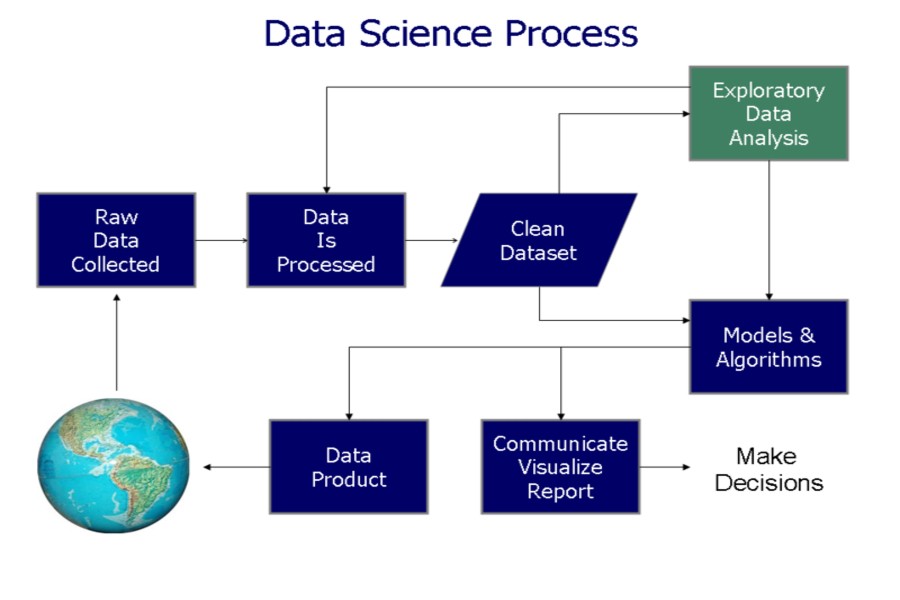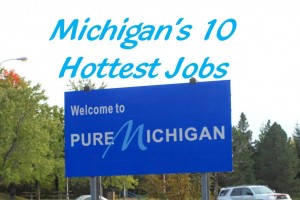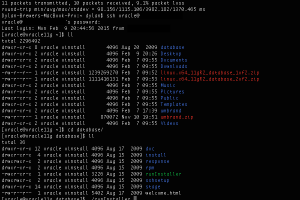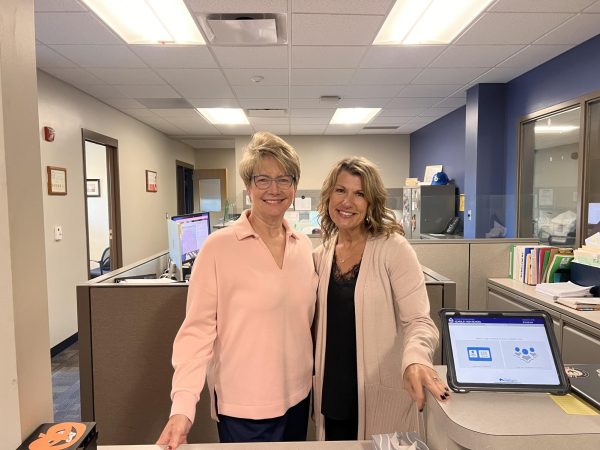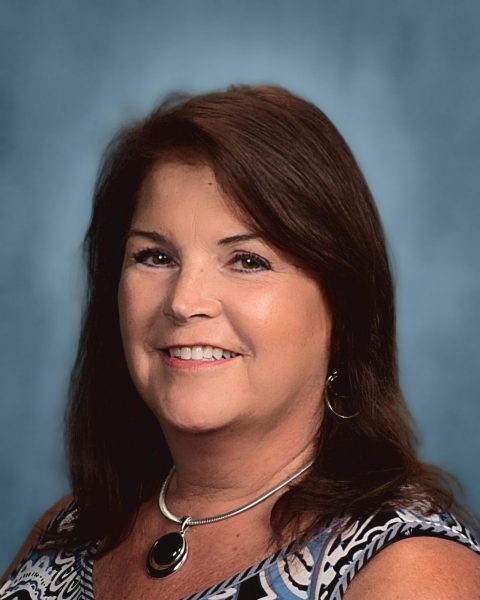Michigan Job Series: Big data, population growth create new jobs
IMAGE / Wikimedia Commons
The flow of data science is important to processing large amounts of data. Data scientists must adjust their actions to the needs of the situation they are asked to work on.
Part Four of the “Michigan Job Series” details jobs that exist because of our increasing population and a growth in data.
Specialized nurses and nurse practitioners
As the life expectancy of the average American increases, there is more demand for nurses capable of caring for patients in hospitals and care facilities.
The stereotypical nurse is often depicted as the mediocre assistant who does all of the busy work while the doctor does all of the important work. However, this is not the case.
Many nurses perform specialized tasks that require training from their employer.
According to discovernursing.com, there are 104 areas to specialize in as a nurse. This list includes neonatal, holistic, radiology, and pain management nurses.
The daily life of a nurse is full of many things: examining patients, ordering tests, prescribing medications, and providing referrals to other healthcare providers.
Dr. Constance Creech, director of the Nursing Graduate Program at the University of Michigan-Flint, said that nurse practitioners spend their time on specific tasks.
“NPs often focus their time on patient education, counseling, and wellness during the patient visit,” Creech said. “Some NPs will also conduct research.”
Nursing has always been a large career field, but the aging population combined with a strong push for cheaper healthcare has greatly increased the demand for capable nurses.
Nurse practitioners are in especially high demand for 2015.
Registered nurses often have an associate’s or bachelor’s degree for nursing, but the demand for more educated nurses is increasing, along with the demand for nurses overall.
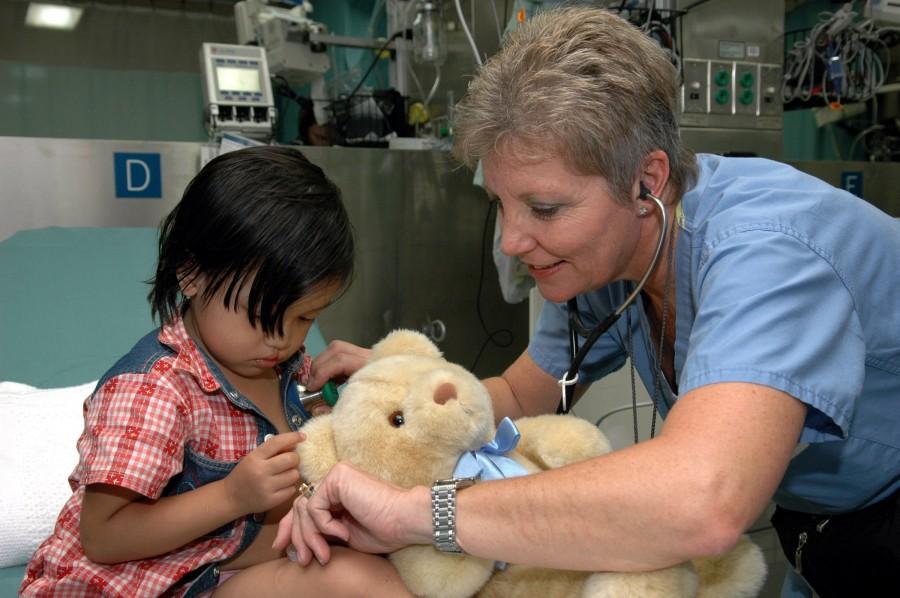
Project Hope nurse, Ms. Diane Speranza, listens to a child’s heartbeat while aboard the U.S. Military Sealift Command Hospital ship USNS Mercy (T-AH 19).
Nurse practitioners are nurses that have graduate education in nursing.
According to the Bureau of Labor Statistics, employment of nurse practitioners is expected to increase by 34 percent from 2012 to 2022, a much faster growth rate than the average for all jobs.
Creech has advice for aspiring nurses.
“If you can spend some time with a registered nurse to see what the role is like, that will help you understand the role of a registered nurse,” Creech said.
Becoming a nurse practitioner takes time and effort, and there are certain skills and attributes favorable for aspiring nurses.
“(It is important to have) strong knowledge in the sciences like biology and chemistry, good interpersonal skills, and excellent problem solving skills,” Creech said.
This high demand for nurses allows hospitals and care facilities to expand accordingly, which means that more data is being collected on the health and medical information of various patients. This data must be handled by electronic health record data specialists.
Electronic health record data specialists
Electronic health records must be handled by specialists who are capable of organizing and managing various databases.
According to the Bureau of Labor Statistics, EHR data specialists are responsible for reviewing patient records, organizing and managing databases, tracking patient outcomes, assigning clinical codes for reimbursement and analysis, recording data, and protecting the confidentiality of patients’ data.
EHR data specialists work closely with registered nurses to clarify diagnoses and make sure that each patient’s medical record is complete and accurate.
Senior Jacob Pietrangelo is interested in becoming an EHR data specialist.
“This job interests me because it is in the medical field,” Pietrangelo said.
Pietrangelo has already taken steps to prepare himself for jobs such as this.
“I am taking an EMT class at the Genesee Career Institute,” he said.
Employment for EHR data specialists is expected to grow 22 percent from 2012 to 2022, which is also much faster than the average growth for all jobs.
Demand for EHR data specialists is rising proportionally with the demand for nurses. As more patients go to physicians’ offices and are admitted to hospitals, more patient data is collected. This data must correspondingly be processed by EHR data specialists.
Although many data specialists leave college after they receive their associate’s degree, it is beneficial to receive additional certifications in order to get the best job offers.
Possible certifications for EHR data specialists include the Registered Health Information Technician certificate and the Certified Tumor Registrar certificate.
EHR data specialists must have analytical, interpersonal, and technical skills in order to succeed. They must also be detail oriented and have integrity.
As technology develops rapidly, data is created and stored at a faster pace.
Many companies that collect large amounts of data have trouble sifting through what they have and finding what actually matters. This is why they hire data scientists.
Data scientists
Data scientists are responsible for processing so-called “big data.”
Big data is a term used to describe the exponential growth of data and its availability.
Traditional methods for analyzing sets of data are impractical to employ on big data, so computer programs and large computer networks are used instead.
Data scientists must be able to sift through sets of data and clean it up, which usually entails removing and reorganizing data in order to better manipulate it.
Mr. Andrew Carson, data science consultant for Matisia Consultants, said that data scientists spend most of their time preparing data.

In an effort to simplify the discussion of defining data science as a discipline, the Data Science Venn Diagram was presented as a high-level summary of the requisite skills.
“Most data scientists say they spend about 80 percent of their time determining what data to gather, gathering that data, and cleaning the data,” Carson said. “The other 20 percent of time would be understanding the requirements of the analysis and then actually doing the analysis and experimentation with the data.”
According to Carson, the latter part involves “running simulations, doing feature selection to determine which fields are the most important, and then interpreting results.”
Data scientists must be able to use various computer programs and programming languages.
One type of software that data scientists use is Hadoop. Hadoop is a software framework that essentially allows for massive data storage and faster processing.
Carson said that Hadoop is used for “parallel processing.” This means that a huge amount of data is spread among hundreds or thousands of computers and processed by each one individually.
Thanks to software such as Hadoop, data scientists can detect patterns and statistical relationships in large sets of data.
Potential data scientists must be skilled at statistics, programming, and mathematics. All three of these are integral parts of the job.
“Having the ability to work with a wide variety of data sets and structures is important as the data scientist will have to gather and compile data that is not easily put together,” Carson said.
Due to the nature of the job, potential data scientists must be willing to experiment, try new things, and think of creative solutions to problems posed by their employers.
Carson said that data scientists must be “jacks of all trade in the data space, knowing how to pull data, clean data, transform data, and analyze data in many different ways.”
Data science is growing rapidly, just like EHR data specialists, nurse practitioners, and specialized nurses.
Michigan’s job market was once dominated by the automotive industry, but it has become more diverse as various career fields have grown at unprecedented rates.

Class: Senior
Clubs: Forensics, Debate
Hobbies: Reading, Solving Rubik's Cubes, Playing online games, Visiting pointless websites
Future Plans:...

